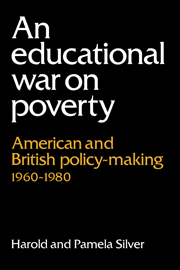Book contents
- Frontmatter
- Contents
- Acknowledgments
- List of abbreviations
- 1 Introduction: a proper complexity
- Part I A pattern of events: United States
- Part II A pattern of events: Britain
- 7 Advancing from poverty?
- 8 Opportunity, equality and social class
- 9 Sounds and silences
- 10 Plowden: direction finding
- 11 Plowden: making choices
- Part III Following through
- Interviews and consultation
- Bibliography
- Index
8 - Opportunity, equality and social class
Published online by Cambridge University Press: 03 October 2009
- Frontmatter
- Contents
- Acknowledgments
- List of abbreviations
- 1 Introduction: a proper complexity
- Part I A pattern of events: United States
- Part II A pattern of events: Britain
- 7 Advancing from poverty?
- 8 Opportunity, equality and social class
- 9 Sounds and silences
- 10 Plowden: direction finding
- 11 Plowden: making choices
- Part III Following through
- Interviews and consultation
- Bibliography
- Index
Summary
A cluster of inter-related themes dominated discussion of education in the late 1950s and 1960s, focusing on comprehensive secondary education, educational opportunity and social class, and involving sustained political controversy and a growing impact by the sociology of education. None of these themes relate directly – until the later 1960s – to a discussion of the concept of poverty, but they are essential to understanding both the later British developments and the absence – until after the publication of the Plowden report on primary education in 1967–of any emphasis on relationships amongst pre-schooling, disadvantage, the environment and poverty. There was during this period virtually no significant public discussion of the primary or nursery school, except in terms of numbers.
The discussion of education and social class has been the most prolonged educational issue of twentieth-century Britain. In its early phases, particularly in the 1930s and 1940s, it related to psychological views of intelligence. From the 1950s it was the central concern of the newly developing sociology of education. Philosophers have engaged in the discussion of the concepts, and the arguments in favour of wider opportunity have often been conducted in economic terms. Given the political repercussions of the discussion, important contributions to the literature were made, particularly in the 1960s, by political scientists. The discussions of the 1950s and 1960s built on decades of growing concern around such concepts as ‘equality’, ‘equality of opportunity’, ‘democracy’ and ‘social justice’, focusing on the structure of the educational system and on access by children from different social groups to its component parts.
- Type
- Chapter
- Information
- An Educational War on PovertyAmerican and British Policy-making 1960–1980, pp. 158 - 186Publisher: Cambridge University PressPrint publication year: 1991

